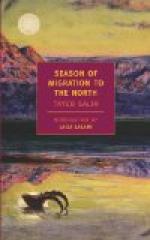One man with long black hair and a cheese-cutter cap creates consternation at the tent-door by claiming treaty for two wives and seventeen children. Mr. Conroy, scenting an attempt to stuff the ballot-box, produces seventeen matches, lays them at my feet on the tent-floor and asks The-Lean-Man to name them. He starts in all right. We hear, “Long Lodge, Little Pine, Blue Fish, Birdtail, Little Bone, Sweet Grass, Ermine Skin,” and then in a monotone he begins over again, “Long Lodge, Little Pine, Blue Fish,” and finally gives it up, eagerly asking the interpreter to wait “a-little-sun.” The drama of paying and recording has gone on for half an hour and we have quite forgotten The-Lean-Man, when back he comes with Mrs. Lean-Man, Sr., and Mrs. Lean-Man, Jr. Each spouse leads her own progeny. Seeing is believing, and off Lean-Man goes with a fat wallet. We wander into the stores to see what purchases the Indians will make. One young blade is looking at a box of stogies, and the clerk says, “He can afford to blow in his wad on perfumes and cigars, that chap, he got a silver-fox last winter.” They tell the story of how old Maurice, Chief of the Chipewyans, put his first treaty money in a cassette and kept it there all the year because he had heard one white man tell another that money grows, and he wanted to see if a white man lies when he talks to another white man.
Sometimes, though, the Indian scores one on the white. This was markedly the case when the first treaty payments were made at Lesser Slave. Two young Jews had followed the treaty party all the way in from Edmonton with an Old Aunt Sally stand where you throw wooden balls at stuffed figures at ten shies for a quarter. “Every time you hit ’em, you get a see-gar!” They thought they were going to clear out the Indians, but it took a bunch of Lesser Slave braves just an hour and a quarter to break the bank at Monte Carlo. As an appreciative onlooker reported, “Them chaps pinked them dolls every time.”
As we leave Resolution in the evening through an open door, we get a glimpse of a woman placing her hands in blessing on a boy’s head. It is the mother of one of our boatmen, Baptiste Bouvier, or “De-deed.” The lad in turn puts a hand on each of his mother’s shoulders and kisses her gaily on both cheeks, grabs the camera, and helps us down the bank. The whistle toots impatiently. We both turn and wave our hands to the mother at the open door.
Travelling all night, we do not go to bed, but merely throw ourselves down for an hour’s rest about midnight, for we must not lose the light effects on this great silent lake. As the captain finds, amid shifting sandbars, a fairway for his vessel, there comes offshore the subdued night-noises of the small wild things that populate the wilderness. Here a heavy tree, its footway eaten out by the lake-swirl round a high point, slumps into the water, and joins the fleet of arboreal derelicts. The raucous voice of a night-fowl cries alarm. Then there descends over all a measureless silence. At three o’clock in the morning we haul into the Hay River Mission, where the familiar mosquito-smudge greets us at the landing.




